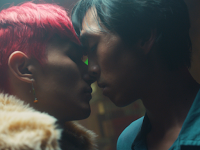Writes Taylor Sprinkle . . .
Critically-acclaimed short films have seen much greater representation across the [LGTBQIA] spectrum, including the 2019 short Kiss of The Rabbit God, which depicts a young man’s encounter with the Rabbit God, the Taoist god of homosexual sex and romance [Tu'er Shen (Chinese: 兔兒神, The Leveret Spirit)].
The film depicts a young and naive Asian American named Matt who works at a compact Chinese restaurant. Matt works tirelessly at the restaurant, taking calls and orders, bussing tables and being the last out the door after closing.
The story starts on the day that a bold and stylish character takes a booth, causing a sudden break from the chaos of Matt’s job. The character, who has already been revealed to the viewer as the Rabbit God [right], introduces himself simply as Shen. The two clearly share chemistry.
After the restaurant closes, the Rabbit God returns, only to leave in a spur of fear and disappointment.
Matt spends the next day longing for the return of the Rabbit God a third time. After the restaurant closes that night, the Rabbit God reappears one more time to give Matt the opportunity to embrace his identity.
Kiss of the Rabbit God is one of the more recent works of Andrew Thomas Huang, a Chinese American filmmaker and artist who is best known as the mind behind many of Björk’s music videos. Huang’s work is often abstract and driven heavily by the use of monochrome — dark, bold and surreal.
In Kiss of The Rabbit God, his style takes no detour from the elements you’d expect. Red and green tones are used to highlight the different personalities alive in the film’s world. Bold, traditional and love-centered red surrounds the persona of the Rabbit God, while the pure shade of green is strongly tied to [the character of] Matt.
And Huang translates ideas with more than just color. The quick, angled shots in parts of the film are used to create the feeling of stress that Matt also experiences during the workday. While he is exposed in a setting where the viewer doesn’t know much about Matt’s character or background, there is a profound sense of his meek, uncertain nature. The purposefully jarring narrative of restaurant work is also used to create a juxtaposition with the slower cuts and more steady shots used during encounters with the Rabbit God.
NOTE: In Chinese myths and legends, the hare and rabbit are interchangeable. (See for example here and here).
See also the previous posts:
• In American Gods, An Otherworldly Depiction of Queer Attraction and Connection
• Trémulo
Critically-acclaimed short films have seen much greater representation across the [LGTBQIA] spectrum, including the 2019 short Kiss of The Rabbit God, which depicts a young man’s encounter with the Rabbit God, the Taoist god of homosexual sex and romance [Tu'er Shen (Chinese: 兔兒神, The Leveret Spirit)].
The film depicts a young and naive Asian American named Matt who works at a compact Chinese restaurant. Matt works tirelessly at the restaurant, taking calls and orders, bussing tables and being the last out the door after closing.
The story starts on the day that a bold and stylish character takes a booth, causing a sudden break from the chaos of Matt’s job. The character, who has already been revealed to the viewer as the Rabbit God [right], introduces himself simply as Shen. The two clearly share chemistry.
After the restaurant closes, the Rabbit God returns, only to leave in a spur of fear and disappointment.
Matt spends the next day longing for the return of the Rabbit God a third time. After the restaurant closes that night, the Rabbit God reappears one more time to give Matt the opportunity to embrace his identity.
Kiss of the Rabbit God is one of the more recent works of Andrew Thomas Huang, a Chinese American filmmaker and artist who is best known as the mind behind many of Björk’s music videos. Huang’s work is often abstract and driven heavily by the use of monochrome — dark, bold and surreal.
In Kiss of The Rabbit God, his style takes no detour from the elements you’d expect. Red and green tones are used to highlight the different personalities alive in the film’s world. Bold, traditional and love-centered red surrounds the persona of the Rabbit God, while the pure shade of green is strongly tied to [the character of] Matt.
And Huang translates ideas with more than just color. The quick, angled shots in parts of the film are used to create the feeling of stress that Matt also experiences during the workday. While he is exposed in a setting where the viewer doesn’t know much about Matt’s character or background, there is a profound sense of his meek, uncertain nature. The purposefully jarring narrative of restaurant work is also used to create a juxtaposition with the slower cuts and more steady shots used during encounters with the Rabbit God.
– Taylor Sprinkle
Excerpted from "Kiss Of The Rabbit God Is The Surreal
and Stirring LGBTQIA Short That You’ll Need To Watch Twice"
Study Breaks
July 30, 2019
Excerpted from "Kiss Of The Rabbit God Is The Surreal
and Stirring LGBTQIA Short That You’ll Need To Watch Twice"
Study Breaks
July 30, 2019
NOTE: In Chinese myths and legends, the hare and rabbit are interchangeable. (See for example here and here).
See also the previous posts:
• In American Gods, An Otherworldly Depiction of Queer Attraction and Connection
• Trémulo
























No comments:
Post a Comment